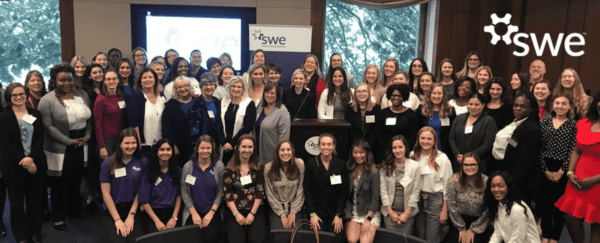Earlier this year, SWE hosted the live session Attract Advocacy of Influential Sponsors with speaker Jo Miller. To provide more insight, Jo answered some additional questions on how to attract an influential sponsor.
What is the difference between mentors and sponsors?
Mentors give you perspective, while sponsors give you opportunities. A mentor will talk with you, but a sponsor will talk about you. Mentors help you skill up whereas sponsors help you move up.
As you consider the different roles played by mentors and sponsors, think about which type of support you’re most in need of right now.
Do you have any advice for establishing credibility and finding a new sponsor when joining a new team or changing companies?
You already know this, but I’ll underscore it: convincing a potential sponsor that you’re worth taking a risk on starts with doing great work. Great performance is essential to attracting sponsors. It’s premature to expect a sponsor to recommend you for your next role if you haven’t yet delivered an outstanding performance in your current one.
I interviewed Nina Bhatti, Director of Engineering at Google Cloud, about how to establish this type of track record in a new company, team, or role. To begin, says Nina, be aware that you’re being observed. People will be watching to see if you can be relied on to deliver what you say you’ll deliver. “Your first job is to build credibility. I don’t think there is anything more important than that,” she says. When given an assignment, execute it well. Show confidence, enthusiasm, and professionalism, and people will learn to trust you. “Train people that you are good for it, and that you can be relied on to deliver,” Nina emphasized.
Once you’ve established this baseline of high performance, Nina recommends finding an initiative that you want to work on and that is on a leader’s goal list. “The sponsor needs to have something to gain from your success,” says Nina. “Look for someone whose objectives are in alignment with what you want to do.”
Early in Nina’s career, after establishing credibility in her role, she approached a senior vice president who needed to accomplish something for a large customer. “I showed him something that I could do that he really needed to deliver,” she recalls. As a result, that leader was intrinsically motivated to become her sponsor.
How can you get others to see your value based on your experience and not your current role? And how to promote yourself when self-promotion is outside your comfort zone?
One Catalyst study found that women who were the most proactive in making their achievements visible advanced further, had greater career satisfaction, and were more likely to attract sponsors. And making achievements known was the only career advancement strategy associated with pay increases.
So why is this so hard to get right?
Of 1,200 workshop participants I have surveyed, 60 percent were not actively taking steps to make people aware of their accomplishments. I think this is because we’ve all worked with people who, to put it mildly, overdid the self-promotion. They hog the limelight, inflate their contributions, create the impression that it’s sleazy to celebrate your own excellence and achievements. So, it’s understandable if you decided “I never want to be like that” and stopped drawing attention to your work and your past experience.
Let’s look at what the real objective really is, because it’s not self-promotion. It is to amplify the accomplishments that align with your aspirations. The aim is not to indiscriminately promote yourself, or grab a bullhorn and overshare. The goal is to amplify the achievements that are most aligned with where you aspire to go. If you’d like some suggestions, here’s a list of 33 ways to amplify your accomplishments. There are sure to be some that fall within your comfort zone.
Do you have any recommendations for when you interact with potential sponsors almost exclusively virtually?
Making yourself known to potential sponsors was already hard enough before COVID-19 disrupted our workplaces. Most of the tactics you might have used to interact with potential sponsors in a face-to-face work setting are still effective when you’re working remotely, though you’ll need to be more deliberate about taking action.
For example, you might be Zoom-fatigued, but don’t skip out on all-hands meetings where you might ask an insightful question, or spot an assignment that’s on a leader’s goal list. And if you review the above-linked list of ways to amplify accomplishments, you’ll see that most of them are still achievable, with minor tweaks.
How do we stay in touch with sponsors when you no longer work on the same team or for the same company?
Great question! Anyone who has contributed to your career growth by believing in you, encouraging you, and using their own hard-won career capital to fight for you is worth staying in touch with. This is true even if they’re no longer in a position to sponsor you. Mentors will often become sponsors, and the reverse is also true, so one way to stay in touch with a former sponsor by asking if they’d be willing to meet for mentoring conversations on a regular basis, such as once per quarter. If you’re stuck for questions to ask a sponsor-turned-mentor, here’s a list of 25 questions to get you started.
How can I train a junior engineer in my office and give her more opportunities? And we have a newer member on our team who hasn’t been getting first pick on assignments so I want to make sure she’s not left behind during planning.
You don’t have to be an executive to enjoy the reward and satisfaction of being someone’s sponsor. If you’ve accrued social capital and influence, you can use them to advocate for others. Hone your talent-spotting instincts by paying attention to the strengths of your coworkers, especially the hidden gems who are being underutilized. Get to know their aspirations. Stick your neck out and become their visible and vocal advocate, especially when it comes to roles or assignments that would be a stretch. In doing so, you’ll also mark yourself as a leader and become more sponsorship savvy.
We typically think of sponsorship in terms of large gestures, like helping someone land the right job. But smaller, everyday actions of “microsponsorship” can be real difference-makers too. Speak up to affirm a person’s competency, bring their name up for a desirable assignment, call attention to a key contribution, or correct the record when someone’s idea is attributed to someone else.
Learn more about attracting a sponsor by watching Attract Advocacy of Influential Sponsors on-demand in the Advance Learning Center or reading 3 Ways to Earn the Backing of Influential Career Advocates by Jo Miller on All Together.
Related Content:
- Podcast: Meet eXXec 2020 Moderator, Jo Miller
- 2019 Public Policy Highlights & New Opportunities for Advocacy in 2020
- Your Questions Answered: Follow-up Q&A on Building Rapport at Work
Author
-

SWE Blog provides up-to-date information and news about the Society and how our members are making a difference every day. You’ll find stories about SWE members, engineering, technology, and other STEM-related topics.





